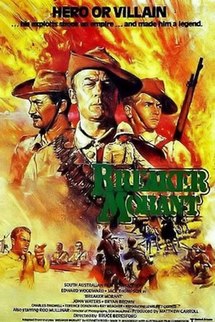Breaker Morant (film)
| Breaker Morant | |
|---|---|

theatrical release poster
|
|
| Directed by | Bruce Beresford |
| Produced by | Matt Carroll |
| Screenplay by | Bruce Beresford Jonathan Hardy David Stevens |
| Based on |
Breaker Morant: A Play in Two Acts by Kenneth G. Ross |
| Starring |
Edward Woodward Jack Thompson |
| Cinematography | Donald McAlpine |
| Edited by | William M. Anderson |
|
Production
company |
|
| Distributed by |
Roadshow Entertainment New World Pictures |
|
Release date
|
|
|
Running time
|
107 minutes |
| Country | Australia |
| Language | English |
| Budget | A$800,000 |
| Box office | $4,735,000 (Australia) $3.5 million |
Breaker Morant is a 1980 Australian war- and trial film directed by Bruce Beresford, who also co-wrote based on Kenneth G. Ross' 1978 play of the same name.
The film centres around the 1902 court martial of Lieutenants Harry Morant, Peter Handcock, and George Witton - one of the first war crimes prosecutions in British military history. Australians serving in the British Army during the Second Anglo-Boer War, Lts. Morant, Handcock, and Witton stood accused of murdering captured enemy combatants and an unarmed civilian in the Northern Transvaal. The film is notable for its exploration of the Nuremberg Defense, the politics of the death penalty, and the human cost of total war. As the trial unfolds, the events in question are shown in flashbacks.
In 1980, the film won ten Australian Film Institute Awards including: Best Film, Best Direction, Leading Actor, Supporting Actor, Screenplay, Art Direction, Cinematography, and Editing. It was also nominated for the 1980 Academy Award for the Best Writing (Screenplay Based on Material from Another Medium).
Breaker Morant remains the movie with which Beresford is most identified and has "hoisted the images of the accused officers to the level of Australian icons and martyrs." In a 1999 interview, however, Beresford explained that Breaker Morant "never pretended for a moment" that the defendants were not guilty as charged. He had intended the film to explore how wartime atrocities can be "committed by people who appear to be quite normal." Beresford concluded that he was "amazed" that so many people see his film as being about "poor Australians who were framed by the Brits."
...
Wikipedia
